Key takeaways:
- Reparations politics involves acknowledging historical injustices and seeking both financial compensation and systemic change to address inequality.
- Civil rights literature highlights the struggles for equality and the resilience of marginalized communities, offering deeper insights into social justice movements.
- Key authors like Toni Morrison, Maya Angelou, and W.E.B. Du Bois have profoundly influenced the understanding of justice, identity, and the necessity for action against systemic racism.
- Future reparations discussions should focus on tangible solutions, intergenerational insights, and collaborative efforts to amplify voices and foster solidarity among communities.

Understanding reparations politics
Reparations politics is a complex and deeply emotional issue that resonates with many people on a personal level. Reflecting on my own journey, I recall a heated discussion I had with a friend about the implications of acknowledging historical injustices. It made me realize that understanding reparations is not just about financial compensation but also about healing and recognizing the scars of the past.
As I delved deeper into this topic, I often found myself grappling with fundamental questions: How do we fairly address the wrongs of history? Is it enough to simply acknowledge these injustices, or do we need tangible actions that facilitate real change? This exploration leads us to consider the responsibility of current generations in rectifying policies that have perpetuated inequality.
I remember attending a community meeting where people shared their family histories and the lasting impacts of systemic racism. Their stories were powerful reminders of the urgency behind reparations. It struck me that these discussions are not merely academic; they carry the weight of personal experiences that demand our attention and action. Lastly, engaging with reparations politics invites us to confront uncomfortable truths and take steps toward a more equitable future.
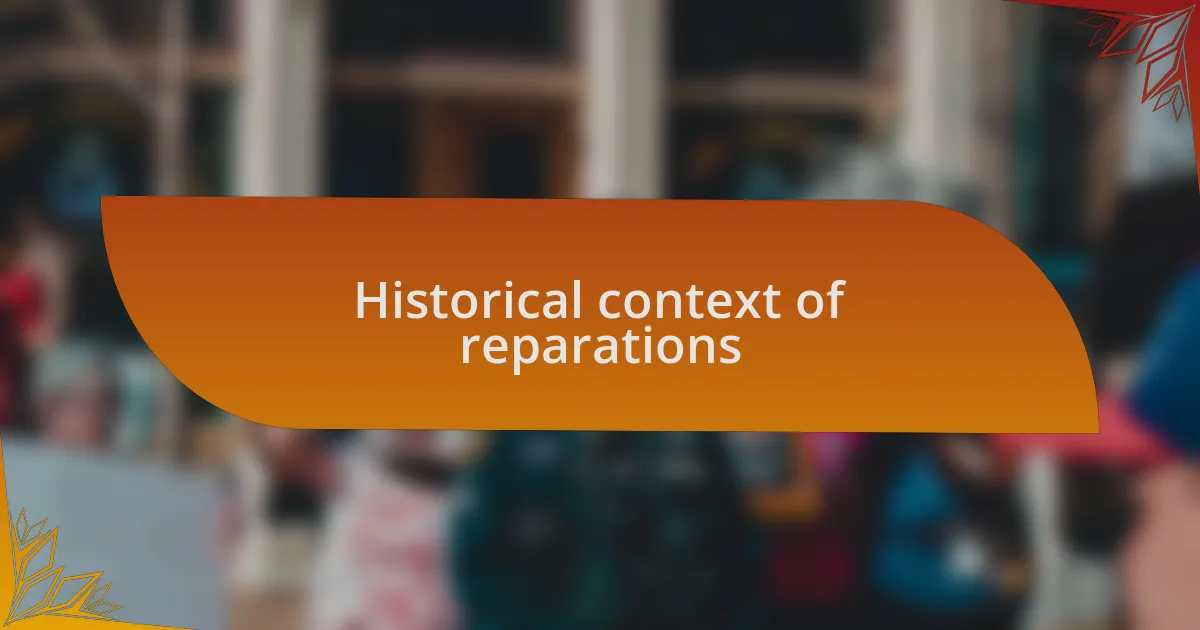
Historical context of reparations
The concept of reparations for slavery in the United States has roots that trace back over a century. I often reflect on the debates from the Reconstruction era, where proposals for economic compensation to formerly enslaved individuals were almost immediately set aside. This makes me wonder how different our societal landscape might look today if those early discussions had led to concrete action.
Fast forward to the 20th century, civil rights movements reignited the conversation about reparations, particularly with figures like Martin Luther King Jr. advocating for economic justice. I recall reading about the 1969 “Kerner Commission,” which reported that the nation was moving towards two societies: one white and one black. This stark observation highlights the necessity for reparative measures to bridge the gap created by systemic inequities.
In more recent years, conversations around reparations have gained momentum, especially amid social justice movements. I remember attending a local forum where various community leaders presented their arguments for reparations, emphasizing not just financial compensation but the need for systemic change and recognition of historical injustices. It made me realize that reparations are about much more than dollars; they are about validation and the moral obligation to address past wrongs.
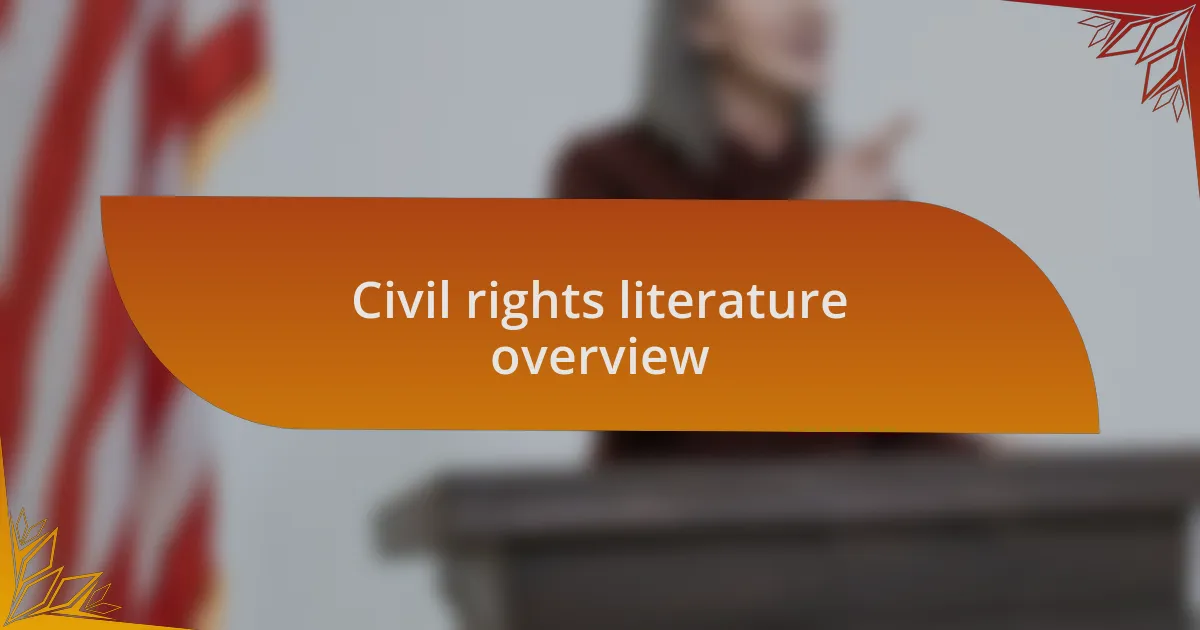
Civil rights literature overview
Civil rights literature serves as a powerful lens through which we can examine the struggle for equality and justice in America. From the poignant words of authors like Zora Neale Hurston and James Baldwin, I often find myself moved by their acute awareness of social injustice. Their narratives not only reflect the harsh realities of discrimination but also offer deeper insights into the human spirit’s resilience. How many times have I paused, absorbed in their prose, contemplating the broader implications of their experiences?
Reading works from the civil rights era evokes a profound emotional response. In books like “The Autobiography of Malcolm X,” I’ve discovered a raw and unfiltered account of the fight for dignity and respect. It’s fascinating how literature can encapsulate the frustration and hope of a movement, conveying truths that resonate even today. Each page seems to beckon me to reflect on how far we’ve come and how far we still have to go.
Moreover, civil rights literature often intersects with the discussions surrounding reparations, making it an essential component of the conversation. For instance, I remember feeling a surge of clarity while reading “Just Mercy” by Bryan Stevenson, which emphasizes the enduring impact of systemic racism. The narratives challenge us to confront uncomfortable truths and engage in critical dialogue about historical injustices. Isn’t it remarkable how literature can inspire action and foster empathy in the fight for reparations?
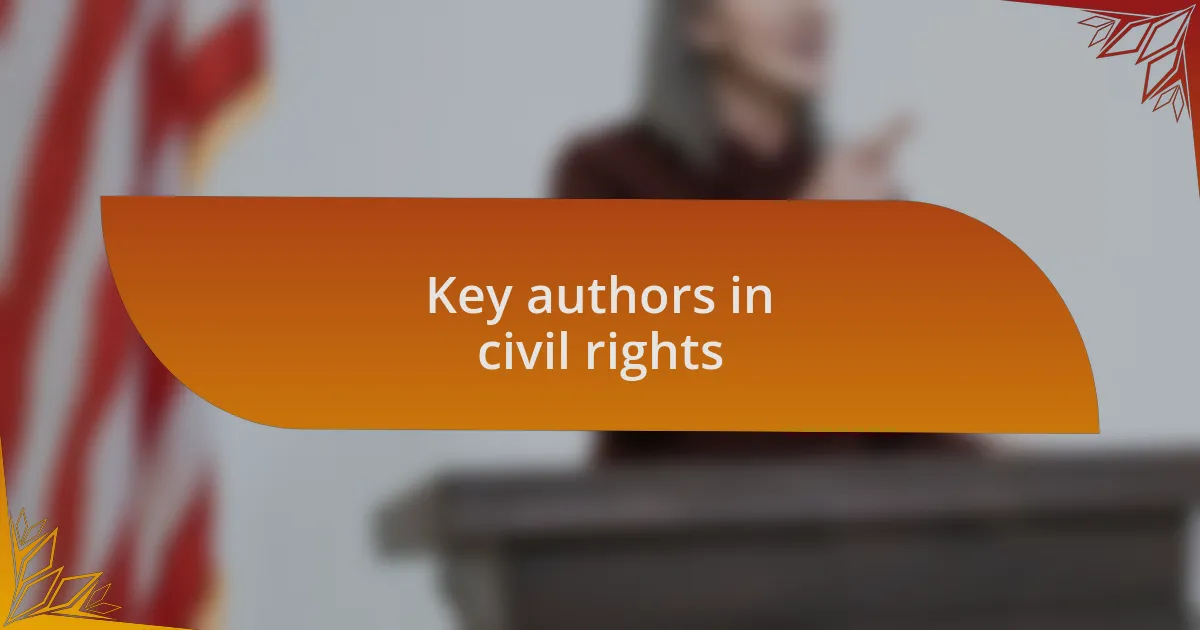
Key authors in civil rights
The landscape of civil rights literature is marked by voices that have shaped our understanding of justice and equality, particularly figures like Toni Morrison and Richard Wright. I still vividly recall the first time I read Morrison’s “Beloved.” The way she intertwines personal trauma with collective history struck a chord in me, making the reader confront the haunting legacy of slavery and its aftermath. Isn’t it powerful how a story can illuminate the stark realities of our past and encourage us to look critically at our present?
Then there’s the iconic work of Maya Angelou, whose “I Know Why the Caged Bird Sings” serves not only as a memoir but a profound commentary on resilience. I remember feeling a wave of inspiration as I read her experiences; they echoed the struggles and triumphs of countless others. Her ability to convey vulnerability while celebrating strength is something I admire deeply. How can we not reflect on our own lives when faced with such authenticity?
Lastly, I can’t overlook the influence of authors like W.E.B. Du Bois, whose seminal work “The Souls of Black Folk” challenged the complacency of his time, urging readers to grasp the severity of racial division. Delving into his writings, I felt challenged yet empowered, as he underscored the importance of education and activism. His call to action resonates, reminding us that literature can ignite change; isn’t that a responsibility we all share?
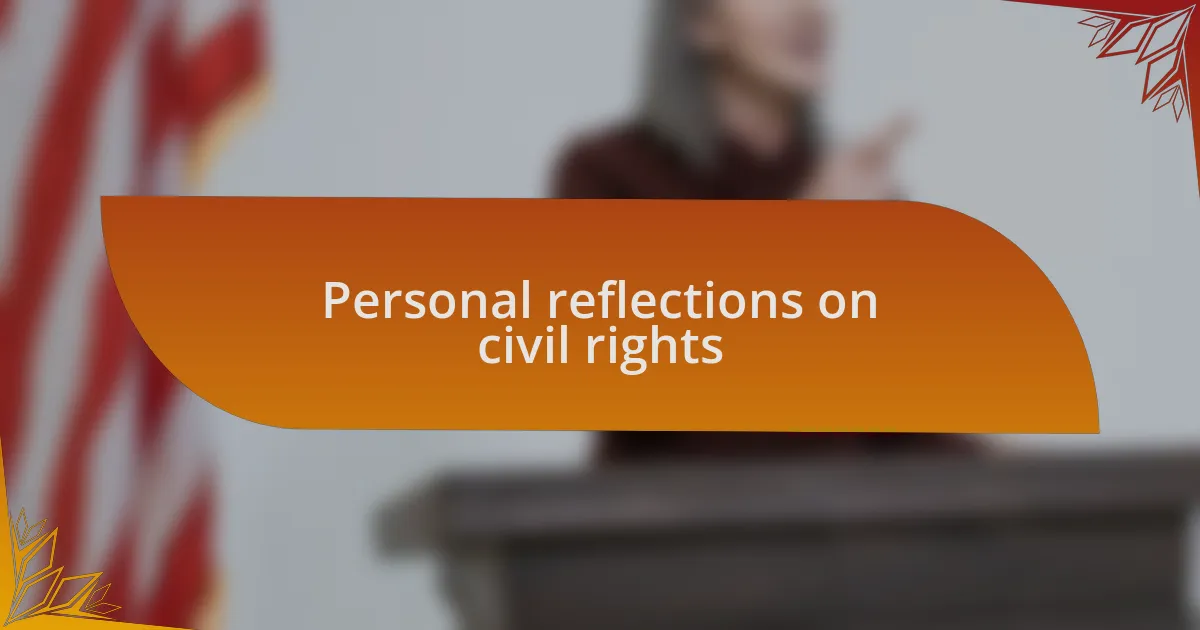
Personal reflections on civil rights
Reflecting on civil rights literature, I often find myself drawn to the moments when words transcend the page and become part of my very being. I was particularly moved during a discussion group where we dissected James Baldwin’s essays. The way he articulates the complexities of identity, love, and rage opened my eyes to the nuanced struggles many face. Have you ever experienced that sense of clarity when grappling with another’s reality? It makes me realize how literature serves as both a mirror and a window to understand ourselves and others.
Another profound reflection comes from my experience reading Alice Walker’s “The Color Purple.” The raw honesty with which she portrays her characters’ lives made me rethink the privileges I sometimes take for granted. I recall feeling a deep empathy for Celie, as her journey of self-discovery laid bare the intersection of race, gender, and personal growth. Isn’t it remarkable how an author can weave such intricate tales that resonate deeply within us, urging us to confront our own beliefs and assumptions?
In my journey through civil rights literature, I’ve often grappled with the weight of the history these works carry. I remember sitting in a park, reading excerpts from Audre Lorde, feeling both inspired and overwhelmed by the urgency of her words. Her insistence on the necessity of intersectionality sparked questions in my mind: How do we ensure that all voices are heard in the fight for justice? Reflecting on these writers has not only deepened my understanding of civil rights struggles but has ignited a passion in me to contribute to the ongoing narrative of equality and justice.
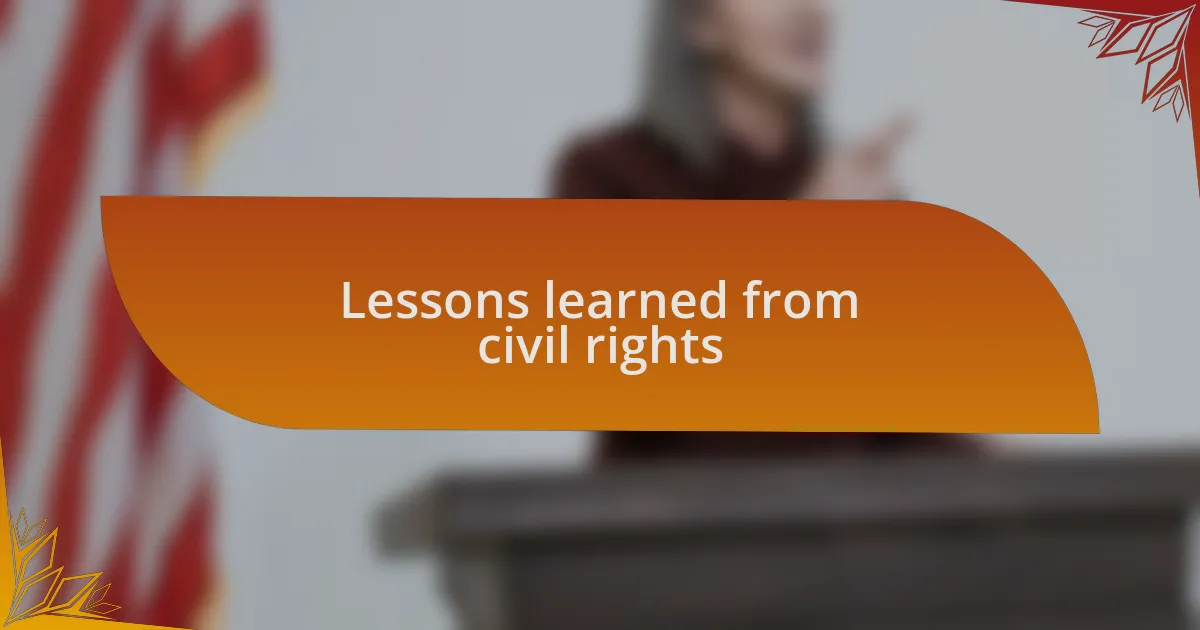
Lessons learned from civil rights
Delving into civil rights literature has taught me that empathy is not merely a feeling; it’s a catalyst for action. I remember a conversation with a friend who had never experienced discrimination firsthand. As we discussed Maya Angelou’s “I Know Why the Caged Bird Sings,” the emotional weight of her story struck him profoundly. It made me realize how vital it is to share these narratives, transforming understanding into solidarity. Have you ever felt compelled to stand up after hearing a story that resonated deeply within you?
Another lesson that resonates with me is the importance of resilience. While reading about the Freedom Riders, I was struck by their courage and determination. They faced danger head-on, motivated by a cause greater than themselves. This led me to reflect: how do we cultivate such tenacity in our own pursuits for justice? The unwavering commitment of those before us serves as a model, reminding me that while the journey is fraught with challenges, our collective effort can lead to meaningful change.
Finally, civil rights literature underscores the power of community. I recall attending a local event centered around Langston Hughes’ poetry, where people from various backgrounds came together to share their experiences. This gathering illuminated how interconnected our struggles are, revealing that we are stronger together. I left with a renewed sense of purpose, pondering how unity can amplify our voices in a world often filled with division. Isn’t it fascinating how literature can inspire real-life connections and foster a sense of belonging?
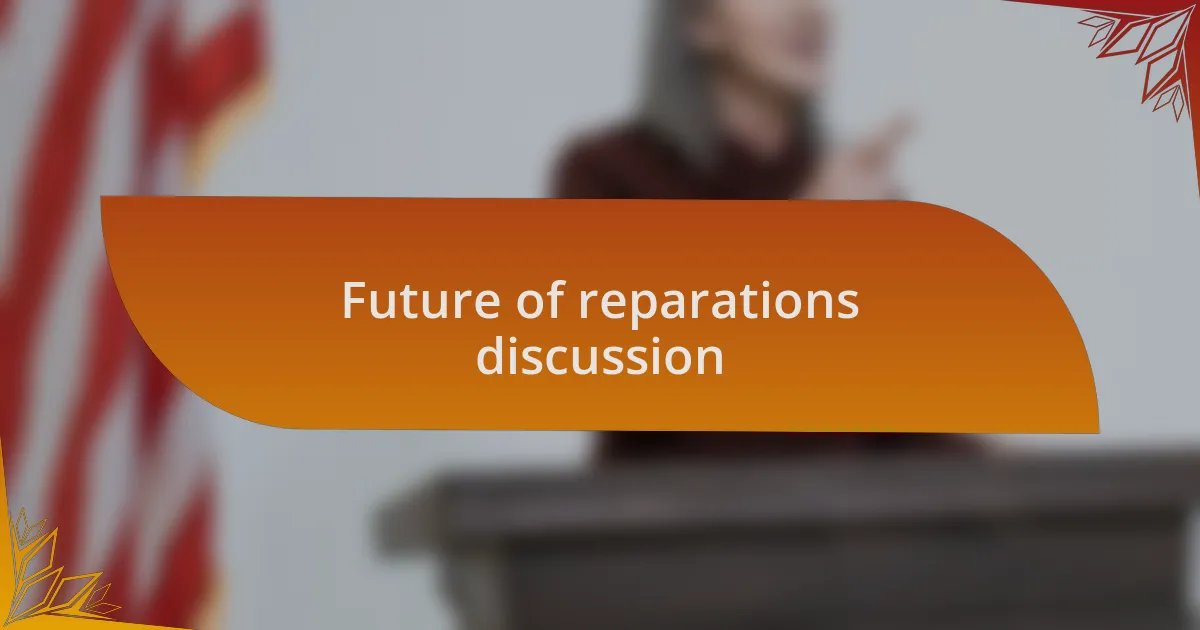
Future of reparations discussion
As I look ahead to the future of reparations discussions, I can’t help but feel a mixture of hope and urgency. I remember a forum I attended, where different perspectives were shared about the complexities of reparations. It became clear that future conversations need to focus on tangible solutions that address historical injustices while fostering dialogue. How can we ensure that the voices of those affected are at the forefront of these discussions?
Moreover, it’s essential to cultivate a space where intergenerational stories contribute to the reparations conversation. In a recent dialogue with my grandmother about her experiences during the civil rights era, I was struck by how her struggles still resonate today. It dawned on me that understanding our past is critical for shaping policies for the future. Why is it that we often overlook the wisdom of those who lived through these times?
Finally, collaboration will be key in moving the reparations discussion forward. During a community meeting, I witnessed firsthand how local organizations joined forces to advocate for reparative policies. This synergy ignited a sense of empowerment among attendees, leaving me with a question: what if this kind of solidarity expanded beyond local spheres? Emphasizing collaboration can bridge divides and create a unified front for justice.